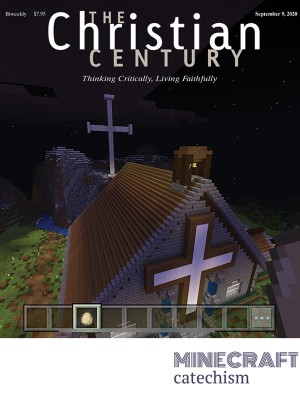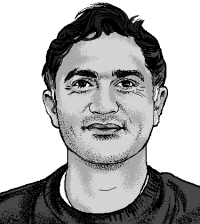Reenvisioning safety at a Black Youth Project 100 rally
Who keeps us safe? the crowd cried out. We keep us safe!

After the police killed Breonna Taylor and George Floyd, the local chapter of the Black Youth Project 100 organized a protest in Durham, North Carolina. Several thousand of us gathered in a plaza downtown to demonstrate our solidarity with the demand, heard from people in the streets across the country, to defund police departments.
“We do not have a criminal justice system,” BYP100 national director D’atra Jackson said through a megaphone. “We have a capitalist system that provides a process for deciding who gets punished.” Her voice echoed from the buildings. “We have a capitalist system that decides who gets health care and who does not.” Jackson’s words were like an electric current, flowing from neighbor to neighbor, charging us for the struggle for a new world.
Read our latest issue or browse back issues.
“If you ain’t talking about socialism, then what you talking ’bout?” Jackson’s speech began to crescendo. “If you ain’t talking about abolition, then what you talking ’bout?” She turned our attention to the leaders of the movement. “If you ain’t talking about black women, what you talking ’bout?”
I heard in her words a renewal of the Combahee River Collective’s 1977 vision for a socialist revolution that is also feminist and antiracist. “[Marx’s] analysis must be extended,” the collective declared, “in order for us to understand our specific economic situation as Black women.” The statement called for a liberation movement that would overthrow the racial injustice that is the raison d’état of our capitalist regime. “If Black women were free,” the Combahee authors concluded, “it would mean that everyone else would have to be free since our freedom would necessitate the destruction of all the systems of oppression.” This late 20th-century cohort of black, socialist lesbians outlined the shape of a freedom for themselves that would be freedom for all—the promise of a world unshackled from oppression.
And this liberation, according to Jackson and her organization of black youth, demands abolitionism: the disarmament of the police, the deconstruction of our carceral society, divestment from the violent institutions of the state in order to invest those funds in what people need to survive and thrive. I heard in Jackson’s words a summons for our community to defund the police in order to re-fund our socioeconomic infrastructure.
I also heard a prayer. “I used to pray for times like this,” she said, “moments that reveal a future, when we see our dreams unfold.” As Jackson spoke, I stood wearing a yellow vest at the perimeter of the crowd, positioned there in my role as a marshal for the rally and march, to help keep demonstrators safe from harm and guide them through the streets. BYP100 and the other organizers asked a local group of us to serve as marshals for the evening: to welcome people into the space, to direct the thirsty to water stations, to notify our medic team if someone needed care, to protect people from traffic, and, when requested, to de-escalate conflict. Manju Rajendran, who trained me for this as part of the Ready the Ground collective, has described our marshaling work as becoming the skin of the assembled body. We are of the people, flesh of their flesh, and we hold the people within us, within the purview of our mutual care—like the body’s skin.
Throughout the evening—as our crew blocked intersections, notified medics of health needs, and monitored plainclothes officers who infiltrated the crowd—my mind drifted to Jackson’s words about having prayed for times like ours, as paths to liberation open before us. With friends and strangers in the streets—as we became a body of protest—I remembered that Sebastian Moore, a Benedictine monk, described public demonstrations as devotion to God. “Unlike the birth of contemplative prayer in the medieval monastery,” he wrote in the 1980s, “its birth today will be political, and generate a holy rage.” As our assembly marched through downtown Durham, our communal movement was spiritual union with the righteous anger of God. Our collective body was a prayer of fire to burn away society’s institutionalized violence against black people.
Within our body, as we walked and shouted, I glimpsed features of the world we longed for. Self-organized cohorts provided food for the hungry among us and pulled wagons stacked with water bottles for the thirsty, all without a price. Medics offered care for the injured, without asking for insurance cards. Friends from a Care Bear team handed me a granola bar and pretzels as they passed by my post at an intersection.
Mutual aid, at whatever scale, is proleptic. These acts prophesy a world to come, a society reorganized for the well-being of all. Mujerista theologian Ada María Isasi-Díaz would call it the kin-dom of God, a way of life in which strangers grow into siblings. Jesus’ movement in the first century knew all about these social practices of communal care: food distribution, healing, kinship—a community devoted to the work of revolutionary love. The Roman Empire killed him for it.
Later in the night, as we concluded the march by occupying the street in front of the police station, a chant bubbled up in the crowd. “Who keeps us safe?” voices called out. “We keep us safe!” the rest of us responded. That’s the world I want, I thought to myself as several of us blocked the road. That’s the prayer I offered with my body in a yellow vest, as I became skin.
A version of this article appears in the print edition under the title “Who keeps us safe?”







